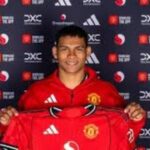How Chelsea Made It to the Club World Cup: A Guide
This briefing provides an overview of key issues at stake and significant facts to date about Chelsea’s involvement in the Club World Cup based on recent reporting on its progress in the competition.
Financial Implications and Tournament Performance
Chelsea’s Club World Cup campaign is reportedly set to pocket the club a sizeable sum of money. Despite a hefty £27 million fine from UEFA on the day of the Palmeiras game, the tournament is lucrative. The semi-final placed alone earned them another £15 million, meaning they have now collected a total of £61 million from the competition. This points to the high-level financial incentives of deep runs in illustrious international club competitions.
Key players and Plays and Squad Update
Chelsea target Estevao, the young Palmeiras forward Chelsea are signing, was hailed as “the best player on the pitch” against his prospective new employers. He was 29 million pound signing last summer, and has spent an additional season on loan at Palmeiras, which exemplifies Chelsea’s model of signing young players and continuing to develop them. His stand-out performance in what was his “final match for the team he is joining Chelsea” will surely serve as a good recommendation for his integration into the team.
There was an impressive performance for Chelsea from their new signing from Brighton, Joao Pedro, who “looked very impressive in the second half” as a substitute. This bodes well for him and is a sign that he is already fitting in and having an impact with his new squad.
But the team has serious adversity to overcome in the form of injuries and suspensions:
The captain, Reece James, pulled up in the warm-up, a considerable blow to the side’s defensive security.
Liam Delap and Levi Colwill were both booked and will not “now be available for the semi-final”. Head Coach Enzo Maresca is going to have to make tactical adjustments with these suspensions.
Emotional Tributes and Team Morale
There was a minute of silence before the game in memory of Diego Jota and his brother Andre Silva. Pedro Netto, a friend of Diego Jota, “wore a Chelsea shirt with the name of Diego Jota and Andre Silva on the back”, a poignant show of remembrance and support.
After the match, head Coach Enzo Maresca emphasised the emotional nature of the victory and told his players that they “won the game for Pedro Netto”. That says a great deal about the ‘us’ and that the motivation to play is not only about winning but something less tangible, a sense of playing for something, for ourselves and for those we remember and come together to honour.
Tactical Insights and Future Challenges.
Chelsea will meet Brazil’s Fluminense in the semifinals, which will take place Tuesday in New York/New Jersey. It will be their third Brazil opposition of the tournament, which a player acknowledged saying, “yeah we played two already now they’re very good teams so it’s going to be another tough game.”
Asked why they had developed as the event had progressed, one player said: “Just getting used to being here the climate’s obviously a big thing the pitches.”. This also stresses that adaptation is everything in high level fighting. What the team needs to learn moving forward is to take every game seriously because “every game’s tough no matter who you play obviously everyone’s there for a reason.”
Fluminense are more of a physical team the rougher they get and yeah we know they are a good team so it’s tough to play against them,” said one player. This is in prospect a hard semi-final against an imposing side.
On Estevao’s move to English football, a colleague struck a note of warning when he said: “obviously he’s only young as well so when he comes to England people need to give him time to obviously adapt to the culture the language he’s still only 18 or 19 or something but you can see he’s got he’s got amazing quality and yeah we look forward to seeing” him in the team.” This is recognising the adjustment period younger players take to settle into new city and league.



